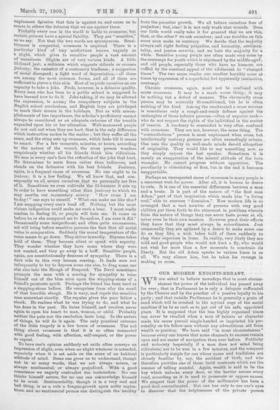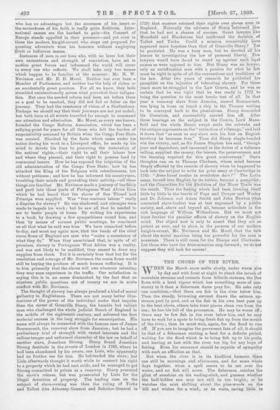OUR MODERN KNIGHTS-ERRANT.
WE are asked to believe nowadays that in most circum- stances the power of the individual has passed away for ever ; that in Parliament he is only a delegate suffocated by the Closure and by the practice of a passive loyalty to his party ; and that outside Parliament he is generally a grain of sand which will be crushed in the myriad cogs of the social machine if he be so rash as to get out of his safe, appointed place. It is supposed that the less highly organised times can never be recalled when a man of talents or character made his cause prevail single-handed or imprinted his per- sonality on his fellow-men without any adventitious aid from wealth or position. We have said "in most circumstances" because every one' knows that some channels to success remain open and are easier of navigation than ever before. Publicity and notoriety (especially if a man does not mind being ridiculous) are to be won in a few minutes, and the conquest is particularly 'simple for one whose name and traditions are already familiar by, say, the accident of birth, and who therefore provides one of those lurid contrasts which are the essence of telling scandal. Again, wealth is said to be the key which unlocks every door, or the barrier across every road, according as it is used to prosecute or oppose causes. We suspect that the power of the millionaire has been a good deal overestimated. But one has only to use one's eyes to discover that the helplessness of the private person
who has no advantages but the stoutness of his ,heart or the earnestness of his faith, is really quite fictitious. Inter-
national causes are the hardest to gain—the Concert. of :Europe stands appalled in their presence—and yet even in. these the modern knight-errant who .steps out prepared for !posting adventure wins his honours without employing illicit or ludicrous means.
Instances of menns,our time who, with no lever but their own earnestness and strength of conviction, have set in motion great forces and influenced the world will occur to every one who reflects. We shall take only two names which happen to be familiar at the moment : Mr. H. W. Nevinsion and Mr. E. D. Morel. Neither has ever been a
'Member of Parliament, and neither has the help' of riches or an accidentally great position. For all we know, they both .stumbled unintentionally across what provoked their indigna- tion. But once the needed reform bad been set before, them
as a goal to be reached, they did not fail or falter on the journey. They had the constancy of vision of a Shaftesbury.
.Perhaps we should say that their journeys are not yet ended ; but both have at all events travelled far enough to command our attention and admiration. Mr. Morel, as every one knows, founded the Congo Reform Association, which has been a rallying-point for years for all those who felt the burden of responsibility assumed by Britain when the Congo Fred State was created. Shocked by the facts which came under his
notice during his work in a Liverpool office, he made up. his mind to devote his time to procuring the restoration of
the natives' rights,—their right to sell their labour how 'and where they pleased, and their right to possess land by communal tenure. Flow he has exposed the iniquities of the old administration of the Congo Free State; how be has 'attacked the King of the Belgians with relentlessness, but without pettiness ; and how he has informed his countrymen, troubling their minds and provoking their activity,—all these
things. are familiar. Mr. Novinsorrmade a journey of heraldp and peril into' those parts of Portuguese West Africa from
which he bad heard that the slaves of San• Thorne and Principe Were supplied. Was "free contract labour" really a disguise for slaVery I' He was shadowed, and attempts were made to impede his work ; but he saw all that he needed to see to bestir' people at home. By writing his eiperiendes in a book, by drawing a few sympathisers round him, and then 'hy means of earnest public meetings, be convinced us all that what he said was true. We have remarked before to-day, and must say again now, that the heads of the chief 'cocoa firms of England are men who "make a conscience of
What they .do." When they ascertained that, in spite of all promises, slavery in Portuguese West Africa was a reality,
and was not likely to be modified, they ceased to draw any supplies from there. Yet it is certainly true that but for the resolution and courage of Mr. Nevinson the cocoa firms would still be buying the produce of much human suffering. It is to him primarily that the slaves will owe whatever relenting they may soon experience in the traffic. Our satisfaction in saying this is in no sense diminished, by the fact that on nineteen public questions out of twenty we are in smite conflict with Mr. Nevinson.
The thought of slavery has always produced a kind of moral gallantry in Englishmen. There are not many better illus- trations of the power of the individual under that impulse than the career of Granville Sharp, the humble but valiant man who challenged the whole judicial Bench of England in the middle of the eighteenth century, and achieved the first material success in the long struggle for emancipation. ' His name will always be connected with the famous case of James Sommersett, the runaway slave from Jamaica; but he had a preliminary trial of strength with vested interests and the callous temper and unformed character of the law on behalf of
another slave, .Jonathan Strong. Sharp found Jonathan Strong destitute in the streets of London in 1765, where be hadbeen abandoned by his owner, one Lisle, who apparently had no further use for him. He befriended the slave; but
Lisle afterwards thought it worth while to reassert his right to a property which he had cast aside, and he managed to get Strong committed to prison as a runaway. Sharp procured the slave's release, but was prosecuted by Lisle for the illegal detention of property. The leading case on the
subject of slave7owning was then. the ruling of Yorke and Talbot (the Attorney-General and Solicitor-General in 1729) that masters retained their rights over :laves even in England. Naturally the advisers of Sharp informed him that he had not a chance of success. Great lawyers like Mansfield and Blackstone had confirmed the decision of Talbot and Yorke. 'Could a mission conceivably have appeared more hopeless than that of Granville Sharp P Yet be 'persisted. He was a busy man, but he devoted all his leisure to investigating the law of personal liberty. Few lawyers would have dared to stand up against such legal names as were opposed to him. But Sharp Was no lawyer, only an uninfluential man with a passion for what he felt mat be right in spite of all the conventions and traditions' of the law. After two years of research he published his pamphlet on the injustice of tolerating slavery. For three years more he struggled in the Law Courts, and be was so certain that he was right that he was ready in 1772 to bring the question to the most heroic test of all. In that year a runaway slave from Jamaica, named 'Sommersett, was lying in irons on board a ship in the Thames waiting to he conveyed back to the plantations. Sharp ,demanded his liberation, and successfully carried him off. After three bearings on the subject, in the Courts, Lord Mans- field and the whole Bench swept aside the cobwebs and the antique arguments on the" extinction of villenage," and laid it down that "as soon as any slave sets his foot on English territory he becomes free." Thus did Sharp single-handed win the victory, and, as Sir James Stephen has said, "though poor and'dependent, and immersed in the duties of a toilsome calling, supplied the money, the leisure, the perseverance, and the learning required for this great nontroversy." One's thoughts run on to Thomas Clarkson, whose mind became deeply affected by the records of slavery when he happenedlo look into the Subject to write his prize essay at Cambridge in 1785 "Anna liceat invilos in servitutem dare ?" The Latin essay, turned into English by its author, became a pamphlet; and the Ceinmittee for the Abolition of the 'Slave Trade was the result. Thus the:feeli4,, which had been forming itself little by little in the hearts of Pepe and Cowper and Wesley and Dr. Johnson and Adam Smith and John Newton (that converted slave-trader) was at last expressed by a' pubic society, and, above and beyond all, became articulate in the rich language of William Wilberforce. But We must not trace further the peculiar effects of slavery on the English mind. Our object now is only to assert that they are as potent as ever,. and to show, in the persons of our modern knights-errant, Mr. Nevinson and Mr. Morel, that the talk about the Social machine being too powerful for the Man. is noneense. There is still room. for the Sharps and Clarksons. Let those who have the determination step forward ; we de not suppose they will lack for causes!











































 Previous page
Previous page